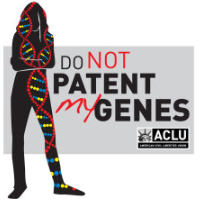Supreme Court Unanimously Rejects Patenting of Genes
 (graphic: ACLU)
(graphic: ACLU)
The U.S. Supreme Court left no doubt about where it stands on the issue of patenting human genes: It’s not legal.
In a unanimous ruling, the court ruled 9-0 that biotechnology companies cannot exclusively use human DNA for medical research.
The case centered on Myriad Genetics, a Utah biotech company that held the patents on human breast and ovarian cancer genes (BRCA1 and BRCA2) for two decades.
“Myriad did not create anything,” Justice Clarence Thomas wrote for the court. “To be sure, it found an important and useful gene, but separating that gene from its surrounding genetic material is not an act of invention.”
Following the decision, some experts said the cost of genetic testing would likely decrease now that more companies can use the genes for research. On the flip side, the ruling could also discourage investment in some forms of genetic research.
Nevertheless, the decision was hailed by many in the industry.
“It levels the playing field; we can all go out and compete,” Sherri Bale, managing director of GeneDx, a testing company, which plans to offer a test for breast cancer risk, told The New York Times. “This is going to make a lot more genetic tests available, especially for rare diseases.”
Eric Lander, president of the Broad Institute, a genetic research center affiliated with Harvard and M.I.T., said the court “got it exactly right.”
“It’s a great decision for patients, it’s a great decision for science, and I think it’s a great decision for the biotechnology industry,” Lander told the Times.
The decision will lead to a sharp change of direction in government policy because, since 1984, the U.S. Trademark and Patent Office has issued more than 40,000 patents related to genetic material.
Biotech executives and patent lawyers said the ruling should not really impact the pharmaceutical industry or developers of genetically engineered crops. That’s because the case did not address patents on synthetic DNA, which drug companies and agricultural biotech rely on.
-Noel Brinkerhoff
To Learn More:
After Patent Ruling, Availability of Gene Tests Could Broaden (by Andrew Pollack, New York Times)
Justices, 9-0, Bar Patenting Human Genes (by Adam Liptak, New York Times)
Supreme Court Says Human Genes Cannot Be Patented, Striking Down Breast and Ovarian Cancer Gene Patents (by Steven Rosenfeld, AlterNet)
Association for Molecular Pathology v. Myriad Genetics, Inc. (U.S. Supreme Court) (pdf)
One Company has Monopoly on Database of Cancer-Related DNA (by Matt Bewig, AllGov)
Doctors and Patients ask Supreme Court to Disallow Patents of Cancer-Related Genes (by Noel Brinkerhoff, AllGov)
- Top Stories
- Unusual News
- Where is the Money Going?
- Controversies
- U.S. and the World
- Appointments and Resignations
- Latest News
- Trump Orders ICE and Border Patrol to Kill More Protestors
- Trump Renames National Football League National Trump League
- Trump to Stop Deportations If…
- Trump Denounces World Series
- What If China Invaded the United States?






Comments